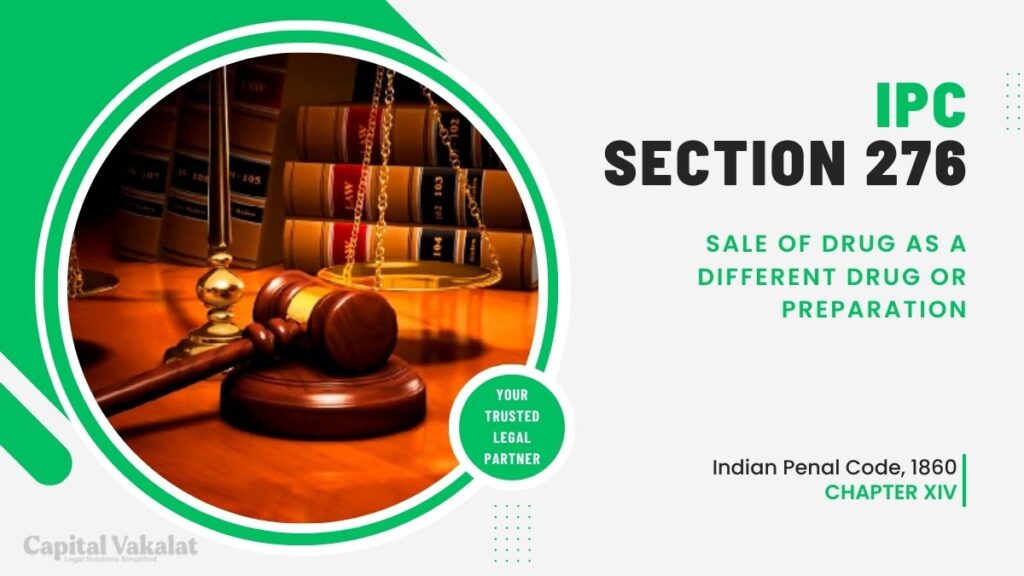In the labyrinth of laws that govern the Indian Penal Code (IPC), Section 276 is a crucial provision that addresses the issue of selling a drug as a different drug or preparation.

This article delves into the nuances of this legal provision, the consequences of violating it, and its broader implications on public health and safety.
Introduction to Section 276 IPC
Section 276 of the IPC deals with offenses related to the sale of drugs as a different drug or preparation. It is a crucial provision that aims to protect the public from unscrupulous practices within the pharmaceutical and medical industries. The sale of counterfeit or substandard drugs poses a grave risk to the health and well-being of individuals.
Understanding the Offense
Selling a drug as a different drug or preparation involves misrepresenting a pharmaceutical product. This offense occurs when an individual or entity knowingly sells a drug, presenting it as something it is not. This misrepresentation can have dire consequences, as it may lead to patients unknowingly consuming a different drug than what was prescribed, potentially causing harm or even fatalities.
Legal Provisions and Penalties
Section 276 of the IPC outlines the legal provisions and penalties associated with this offense. Offenders can face severe consequences, including imprisonment and fines. The legal system takes this offense seriously to deter individuals and entities from engaging in such practices.
Historical Context
To understand the gravity of the issue, it is essential to delve into the historical context of this legal provision. Section 276 was included in the IPC to address concerns about the proliferation of counterfeit drugs and the need to protect public health.
Challenges in Prosecution
While Section 276 is a robust legal provision, prosecuting offenders can be challenging. The burden of proof lies with the prosecution, and establishing intent and knowledge on the part of the accused can be difficult. This poses a significant challenge to bringing offenders to justice.
Case Studies
To illustrate the real-world implications of this offense, we can look at a few case studies where individuals or entities were prosecuted under Section 276. These examples shed light on the complexity of the issue and the consequences faced by offenders.
Role of Regulatory Authorities
Regulatory authorities play a crucial role in preventing the sale of drugs as different drugs or preparations. They are responsible for ensuring that pharmaceutical products meet stringent quality and safety standards. The effectiveness of these authorities directly impacts public safety.
The Importance of Drug Safety
One of the key takeaways from Section 276 IPC is the paramount importance of drug safety. The offense it addresses can result in patients receiving ineffective or harmful drugs. Drug safety is not just a legal requirement but a moral obligation that the medical and pharmaceutical industries must uphold.
Awareness and Prevention
Preventing the sale of drugs as different drugs or preparations requires awareness and proactive measures. Healthcare professionals, consumers, and regulatory bodies must work together to detect and report instances of counterfeit drugs. Public awareness campaigns can also play a significant role in educating consumers about the risks and how to identify genuine pharmaceutical products.
Conclusion
In conclusion, Section 276 IPC serves as a vital legal provision to protect public health by addressing the sale of drugs as different drugs or preparations. It not only outlines legal consequences for offenders but also highlights the broader importance of drug safety. It is imperative for individuals, regulatory authorities, and the medical industry to work collectively to prevent such offenses and safeguard public health.
Frequently Asked Questions
What penalties do offenders face under Section 276 IPC?
Offenders can face imprisonment and fines if found guilty under Section 276 IPC.
How can consumers protect themselves from counterfeit drugs?
Consumers can protect themselves by purchasing drugs from reputable sources, checking for proper labeling and packaging, and reporting any suspicious products to regulatory authorities.
Are there any recent developments in the enforcement of Section 276 IPC?
The enforcement of Section 276 IPC is an ongoing process, with regulatory authorities continually working to combat the sale of counterfeit drugs.
What role do pharmaceutical companies play in ensuring drug safety?
Pharmaceutical companies have a responsibility to produce and distribute safe and effective drugs. Compliance with quality and safety standards is crucial in this regard.